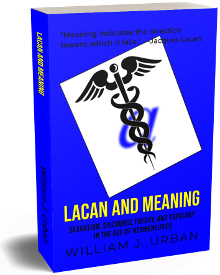Freedom qua Spontaneity:
The Lacanian Subject in the Critique of Pure Reason
WILLIAM J. URBAN
Introduction
In his Introduction to Tarrying with the Negative, Slavoj Žižek extends Badiou’s thesis regarding the number of crucial breaks in the history of philosophy from two to three: alongside Plato and Kant should stand Jacques Lacan. All three have disrupted their respective ‘sophist’ ages from within, Lacan most recently by affecting a rupture with our ‘postmodern’ age of deconstructionism and neopragmatism. (Žižek 1993: 4) One is tempted to say that Žižek’s numerous books serve to testify to this accomplishment, as if his entire oeuvre exists solely to provide us with ample demonstrations of Lacan’s subversive break with contemporary theory’s tendency to relativize Truth. We find, for example, essays devoted to the strengths of psychoanalytic theory over Derridean deconstruction (Žižek 2005a) and sustained Lacanian critiques against cognitivist researchers such as Daniel Dennett. (Žižek 2006: ch 4; 1998). But for all the diverse and seemingly unrelated material which engages Žižek, there is a common thread running throughout and which paradoxically also serves as the very space of their occupation. This concerns a defense and explication of the Lacanian subject and Žižek has consistently argued for a return to German Idealism to find its proper philosophical expression. But while Žižek himself has always maintained that Hegel operates as the privileged philosophical reference point, this should in no way diminish Kant’s contribution, as he was the first to fully articulate this subject with the publication of the Critique of Pure Reason. One of the main objectives in this paper is to clarify the debt owed to Kant by a further exploration of how Kant expresses and utilizes this subject in the Critique.
Our approach will be in two parts. In (the comparatively brief) Part I, we will take up the Kantian subject as such and argue for its equivalence to Lacan’s notion of subjectivity. But instead of closely working through how Kant first formulates the transcendental I of apperception in the opening paragraphs of the Transcendental Deduction, we examine how this notion of subjectivity is already operative in the Dialectic with a detailed examination of his discussion in the Paralogisms of Pure Reason. We will find that Kant’s argument there is still relevant, provided that we understand how he must have had in mind a purely logical and necessary apperceptive I strictly analogous to Lacan’s non-substantial subject of the unconscious. Žižek claims that this subject is none other than cogito.
In Part II, our task will be to inquire into a key characteristic of this subject: his capacity for spontaneity. We note upfront that we are not here concerned with how the ‘moral agent’ of practical reason makes a nascent appearance in the first Critique. Thus we set aside Kant’s discussions of Transcendental Freedom (which are usually examined in its cosmological guise in the Third Antinomy), as well as the distinctions drawn with Practical Freedom in the Canon. These are best left to a retrospective account from a second Critique vantage point. Rather, after examining how the Lacanian notion of the subject is fully operational in the Paralogisms, we return to the core of the Analytic to inquire into how both an empirical and an intelligible character can be ascribed to a single ‘rational agent.’ That is, how does Kant conceive one and the same action as both causally determined by the antecedent state to the subject (the manifold) and as a product of the spontaneity of the subject? We provide a new framework to this issue by addressing a problem which suggests itself in Žižek’s text: in precisely which faculty of human cognition does Kant locate the spontaneity characteristic of the subject? We feel that by closely examining three major commentaries concerning how and where Kant articulates the transcendental subject’s capacity for spontaneity in the Critique, this prepares one to not only better conceptualize freedom as set forth in the Dialectic, but more crucially to facilitate a proper engagement with Kant’s later practical texts where the fact of the subject’s freedom becomes key to understanding his revolution in ethicality.
Lacanian-themed puzzles

